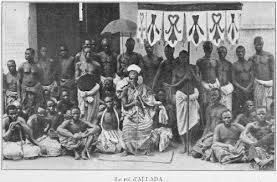It is quite easy to see how important traditions are in the world of Chinua Achebe's notorious novel Things Fall Apart, which of course reflects the importance of customs and ceremonies in our lives as a society and as individuals.
In the novel, different ceremonies take place along the year in Umuofia and, as the book states, "A man's life from birth to death was a series of transition rites which brought him nearer and nearer to his ancestors". This is also a remark of the closeness there is between the people and those who preceded them, as well as of the commitment of the Igbo people with the traditions they inherited from their ancestors.
| Tradition for many Chileans |
In that same sense we can turn to our modern world, and our own place in society as Chileans. For quite a big portion of the population, tradition means no more than cueca, vino, chicha, empanada and maybe fútbol, encompassed in what can be seen as a calendar that designates when to celebrate and what to do. In the Igbo culture, in contrast, most traditions and festivities are born from the daily lives of the Igbo people, the planting and harvesting seasons, the work that must be done to provide food to the families and the things that are learned from that hard work. Those are reasons to celebrate and we can see how, driven by their work, the Igbo really lived their culture, rather than adapt to what they are told to celebrate, most of the times, by other people (who this way are able to satisfy their own needs) and not by the people themselves so that they can enjoy being members of a nation and its culture.
| Missionaries among natives. |
This leads us to the almost complete and blatant lack of knowledge about our own customs, their origins and history, our national heroes and personalities, our artistic expressions and artists, led obviously by the influence of foreign novelty, in the same way that most of the Igbo were blinded by the "wonderful" Christian religion and converted when given the chance.
Yet still some did not convert to the Christianism and stayed where they thought they belonged. Among the Igbo there was a strong bond with their land, as well as with the elderly people, who were seen as a source of knowledge and wisdom. The oldest men spoke with the most wisdom. And we can see in the novel how strong is the bond between people, their families and the homelands of their progenitors. As a matter of fact, in the Igbo political system, the family is an important institution. As Nigerian historian Oyediji Oluwaseun Babatunde says, "the Family Group is one of the most recognized institutions in pre-colonial Igbo society as the basic unit of every political institution. It comprises people of the same family. Not only that, each family group was autonomously headed by the title holder called ‘OKPARA’. The Okpara controls the family and judges any family disputes. He performs ritual and ceremonial functions on behalf of the family" (Oyediji, 2014).
This strong connection with the family, umunna; the persistent sense of belonging to the land, and the importance of the hard work embody one key element in the setting of this novel: Tradition in community. The Igbo people were able to preserve their customs and integrate them to their lives rather than living as slaves for them and for their deities. That is one of the things that transports you to their time and helps you visualize the events that take place in Umuofia, the land of Okonkwo.
References
https://profseunoyediji.wordpress.com/2014/04/06/igbo-pre-colonial-political-system-in-nigeria/
Achebe, C.(1958) Things Fall Apart. 92.


No hay comentarios:
Publicar un comentario